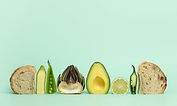Our gut carries trillions of bacteria and other organisms living inside the small and large intestines, known as the microbiota or intestinal flora.
Microbiota affects everything, including our digestion, ability to absorb nutrients, immune system, brain performance, and mood. Therefore, the more we take care of our microbiota, the healthier we will be!

Foods for Gut Health to Improve Microbiota:
Maintaining a healthy gut contributes to better immune function, digestion and nutrient absorption, and overall health.
By making appropriate lifestyle and dietary changes, you can alter the diversity and number of microbes in your gut to optimize your health.
1. Probiotics in Fermented Foods
Probiotics are live bacteria found in fermented foods or supplements, and they can provide numerous health benefits. Fermented foods containing probiotics have been part of the human diet for centuries and positively influence our gut microbiome and overall health.
Fermented foods increase overall gut microbiota diversity and reduce key markers of inflammation, promoting gut health.
The Best Foods High in Probiotics for Gut Health
Kimchi
Greek yogurt, plain
Sauerkraut
Kefir
Natto
Fermented miso
Kombucha
Vegetable brine drinks
Note: to preserve the live probiotics, do not heat fermented foods above 115°F.
2. Prebiotics
Prebiotics are a type of fiber in the diet that our body cannot digest. These fibers help “friendly” bacteria grow in your gut. Think of this as food for the bacteria.
Prebiotics have a beneficial effect since they stimulate the growth of beneficial intestinal bacteria instead of harmful ones, restoring intestinal flora.
Prebiotics are not digested but are fermented in the small bowel, leading to positive effects like an increased number of beneficial bacteria in the colon and favoring the absorption of minerals like calcium, iron, magnesium, and zinc. They also help with constipation and inflammatory bowel disease (5, 6).
Prebiotics are found naturally in many foods, that's because prebiotics is a type of fiber found in vegetables, fruits, beans and legumes.
Prebiotics and probiotics help cultivate balance in our gut microbiome and support whole-body wellness.
Prebiotics are best known as dietary fiber types of fructooligosaccharides (FOS) and galactooligosaccharides (GOS), which provide the most evidence of beneficial health effects due to their fermentation (7).
According to a 2019 National Library of Medicine article, "Prebiotics exert a remarkable influence on human health, making them allure attractive agents to improve the quality of human life against cancer, vascular diseases, obesity, and mental disorders."
The Best 17 Foods High in Prebiotics for Gut Health
Garlic
Onion and leek
Bananas
Oats and barley
Jerusalem artichoke
Asparagus
Chicory root
Dandelion greens
Flaxseeds
Cocoa powder
Apples
Legumes (beans, lentils, and peas)
Seaweed
Wheat bran
Jicama root
Konjac root
Burdock root
3. Avoid Processed Foods & Artificial Sweeteners
A diet low in fiber and an excess of red meat, fat, and sugar can negatively affect the intestinal flora.
In addition, researchers say that sucralose, aspartame, and saccharin may interfere with microbiome diversity and hinder the body's ability to absorb blood sugar (8).
Emulsifiers in processed foods can destroy the protective layer of mucus in the intestines, where many beneficial microbes reside (9).
Moreover, studies demonstrate emulsifiers also interact with our microbiota resulting in low-grade inflammation that can increase body fat and its associated metabolic effects like impaired fasting glucose, high triglyceride levels, and low HDL cholesterol levels (9).
Sleep
Achieving a good quality and duration of sleep each night (generally 7-9 hours) will reduce stress which, in turn, promotes gut microbiome health (10).
Research suggests that the state of the intestinal microbiota influences sleep since both mechanisms are related and constantly interact (11).
When there is a poor and less diverse microbiota, it significantly reduces the duration and quality of our sleep.
Further, poor sleep hygiene leads to an imbalanced microbiota, known as dysbiosis (12). Altered gut bacterial composition (dysbiosis) has been associated with the pathogenesis of many inflammatory diseases and infections
References





留言